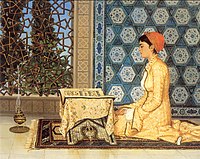Women in Islam

In Islam, women are treated just as important as men. They have the same rights and responsibilities, and they should be treated with respect and kindness by men and women alike.
Women in Islam are supposed to cover their hair and body in public, although this rule isn't always followed by all Muslim women. They are encouraged to be modest in how they dress and behave, so they are not attracting unwanted attention from men.
Despite what people might think, women in Islam have many rights. For example, they are allowed to own property and manage their own finances independently of men. They can also inherit money and property from their family members, and they have the right to get an education.
There are a few differences between men and women in Islam when it comes to religious practices. For example, during prayers, women are supposed to stand behind men. However, this isn't meant to be a sign of disrespect; it's just part of the prayer ritual.
In Islam, women are also not allowed to lead congregational prayers, but they are allowed to lead prayer in smaller, informal settings with other women. Overall, women in Islam are cherished and respected, and their contributions to their families and communities are highly valued.
Women in Islam are supposed to cover their hair and body in public, although this rule isn't always followed by all Muslim women. They are encouraged to be modest in how they dress and behave, so they are not attracting unwanted attention from men.
Despite what people might think, women in Islam have many rights. For example, they are allowed to own property and manage their own finances independently of men. They can also inherit money and property from their family members, and they have the right to get an education.
There are a few differences between men and women in Islam when it comes to religious practices. For example, during prayers, women are supposed to stand behind men. However, this isn't meant to be a sign of disrespect; it's just part of the prayer ritual.
In Islam, women are also not allowed to lead congregational prayers, but they are allowed to lead prayer in smaller, informal settings with other women. Overall, women in Islam are cherished and respected, and their contributions to their families and communities are highly valued.
Related topics others have asked about:
Cairo Declaration on Human Rights in Islam,
Concubinage,
Concubinage in Islam,
Female figures in the Quran,
Female political leaders in Islam and in Muslim-majority countries,
Gender roles in Islam,
History of Concubinage in the Muslim world,
Houri,
Islam and humanity,
Islamic feminism,
Islamic schools and branches,
Islamic sexual jurisprudence
